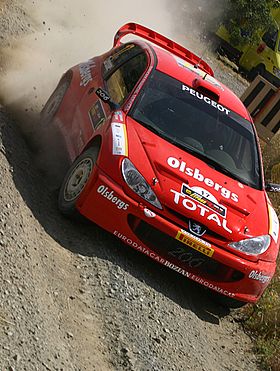Peugeot 206 WRC
| Peugeot 206 WRC | |
|---|---|
 |
|
| Overview | |
| Manufacturer | Peugeot |
| Production | 1999-2003 |
| Body and chassis | |
| Class | World Rally Car |
| Layout | 4-wheel drive |
| Powertrain | |
| Engine | 2.0 L (122 cu in) 4-cylinder, 16-valve |
| Transmission | X-trac |
| Dimensions | |
| Wheelbase | 2,486 mm (97.9 in) |
| Length | 4,005 mm (157.7 in) |
| Width | 1,770 mm (70 in) |
| Height | 1,300 mm (51 in) |
| Kerb weight | 1,230 kg (2,712 lb) |
| Chronology | |
| Predecessor | Peugeot 205 Turbo 16 E2 |
| Successor | Peugeot 307 WRC |
Peugeot 206 WRC is a World Rally Car based on the Peugeot 206. It was used by Peugeot Sport, Peugeot's factory team, in the World Rally Championship from 1999 to 2003. The car brought Peugeot the manufacturers' world title three years in a row from 2000 to 2002. Marcus Grönholm won the drivers' title in 2000 and 2002.
In 1999, Peugeot Sport unveiled the 206 WRC, and it competed for the first time in that year's World Rally Championship, with French tarmac veteran and long-time marque stalwart Gilles Panizzi narrowly failing, against a resurgent reigning champion in Mitsubishi's Tommi Mäkinen, to win the Rallye Sanremo. The car was soon a success, however, and won both the manufacturers' and drivers' championships in 2000, Peugeot's first such accolades since their withdrawal from the WRC after Group B was banned after the 1986 season, and achieved in the hands of Panizzi, Francois Delecour and Mäkinen's successor as drivers' world champion, Marcus Grönholm.
...
Wikipedia
